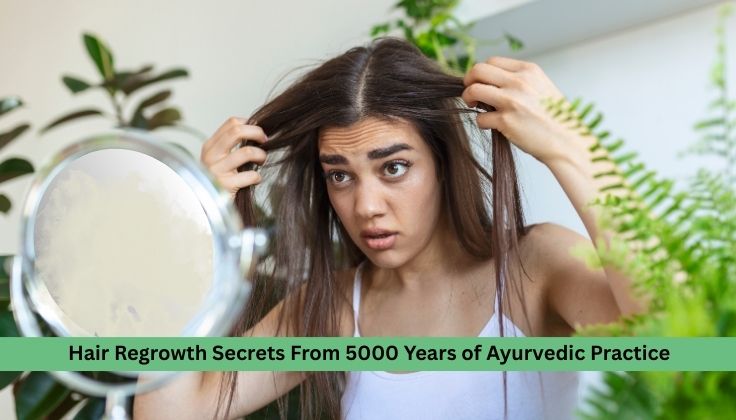


Hair loss is not a new problem. It has affected people for centuries. What’s interesting is that long before modern shampoos or supplements existed, Ayurvedic medicine had already developed a structured approach to managing hair and scalp health. Ayurveda offers practical and natural solutions that continue to be effective even today. Many people seeking these traditional treatments now visit a reputed Ayurheritage clinic in Dubai to access authentic remedies. Let's look at how these ancient practices can help restore your hair naturally!
Ayurveda links hair health to overall body balance. It looks at hair as a by-product of bone tissue (asthi dhatu). If your digestion is weak or your body is imbalanced, your hair will likely show the signs. This system uses the concept of the three doshas: Vata, Pitta, and Kapha. Each person has a unique combination, and imbalances in any of these can affect hair.
Excess Pitta is linked to premature greying, thinning, and hair loss.
Imbalanced Vata can cause dry scalp, brittle strands, and frizz.
High Kapha may lead to an oily scalp and blocked follicles.
The key is to identify which dosha is out of balance and work on correcting it.
Some lifestyle aspects that you may not even think would affect your hair loss might matter!
Ayurveda focuses on strengthening the roots, improving internal health, and using natural methods. Here are some of the most effective practices that have stood the test of time.
This is not just a relaxing ritual. Oiling the scalp improves blood circulation and nourishes the roots. You may choose oils based on your dosha.
Bhringraj oil: Great for Pitta-related issues. It cools the scalp and strengthens the roots.
Brahmi oil: Calms the nervous system and supports hair growth.
Coconut oil: Ideal for cooling and moisturizing.
Neem oil: Useful for dandruff and scalp infections.
Massage the oil into your scalp with ample pressure and leave it on for a few hours or overnight. Wash with a mild herbal shampoo.
Using hair masks made from natural powders provides deep conditioning and strengthens follicles.
Amla: Rich in Vitamin C. It rejuvenates hair and supports melanin production.
Shikakai: Natural cleanser that maintains scalp health.
Reetha: A gentle cleanser that also promotes hair shine.
Fenugreek (methi): Helps with dandruff and strengthens hair from the root.
Mix these with water, curd, or aloe vera gel and apply once a week.
Hair health depends heavily on the nutrients you consume. Ayurveda recommends food that supports all seven dhatus (tissues).
Include ghee, almonds, black sesame seeds, and leafy greens.
Eat seasonal fruits, especially pomegranate and amla.
Drink warm water with triphala or lemon to support digestion.
Avoid very spicy, salty, and oily food, especially if you have Pitta imbalance.
The idea is simple: if your body is well-nourished, your hair will be too.
Ayurvedic herbs have adaptogenic and restorative properties.
Ashwagandha: Reduces stress, a common trigger for hair fall.
Bhringraj: Promotes natural hair growth and prevents greying.
Amla: Strengthens follicles and purifies blood.
Shatavari: Helps with hormonal balance, especially in women.
These should be taken under the supervision of a qualified practitioner.
Simple and small daily actions can have a big impact over time, like.
Sleep before 10 PM to support natural body repair.
Practice yoga or meditation to manage stress.
Use wooden combs to reduce static and scalp damage.
Avoid washing hair with hot water. Lukewarm or cold water is better.
Keep your scalp clean, but avoid overwashing.
What this really means is that your habits build your health, including your hair.
For chronic hair fall or imbalances, Ayurveda recommends detox therapies known as Panchakarma. These include:
Shirodhara: A steady stream of oil that is poured on your forehead. It calms the nervous system.
Nasya: Medicinal oils administered through the nose to clear toxins from the head region.
Abhyanga: Full body massage with medicated oils.
These should only be done in licensed Ayurvedic centers under professional guidance.
Hair responds to the state of your nervous system. High cortisol levels can disrupt the growth cycle. Ayurveda encourages balancing the mind along with the body.
Daily breathwork (pranayama) can calm Vata.
Mindful walking, journaling, and digital detoxes help reduce mental clutter.
Stay connected with nature. Even 15 minutes of morning sun supports hormonal balance.
To recapitulate, hair regrowth is possible, but it requires consistency and an understanding of what's really going on in your body. The thing is, there is no magic pill for it. But when you align your internal health, habits, and external care, you'll see real change. The wisdom of Ayurvedic practice is about overall balance. And healthy hair and scalp are just one of the many benefits. Many women discover these benefits while seeking postnatal care, as Ayurvedic treatments help restore hair lost during pregnancy and childbirth.
So, if you are considering this route, start small. Choose one oil, one habit, and build from there. Consult a qualified Ayurvedic practitioner to guide you with herbs or therapies suited to your dosha. This 5000-year-old tradition has lasted this long for a reason. It works naturally and deeply.